 Petzlover
Petzlover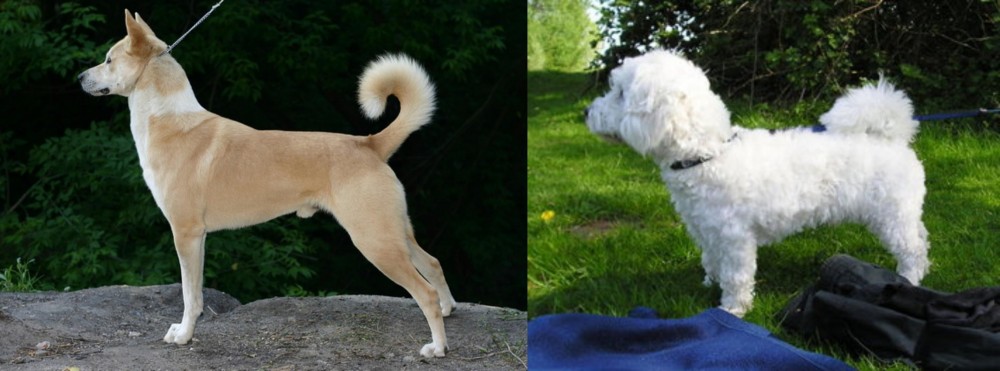 Canaan Dog is originated from Israel but Franzuskaya Bolonka is originated from France. Canaan Dog may grow 34 cm / 14 inches higher than Franzuskaya Bolonka. Canaan Dog may weigh 20 kg / 45 pounds more than Franzuskaya Bolonka. Both Canaan Dog and Franzuskaya Bolonka has almost same life span. Canaan Dog may have more litter size than Franzuskaya Bolonka. Both Canaan Dog and Franzuskaya Bolonka requires Low Maintenance.
Canaan Dog is originated from Israel but Franzuskaya Bolonka is originated from France. Canaan Dog may grow 34 cm / 14 inches higher than Franzuskaya Bolonka. Canaan Dog may weigh 20 kg / 45 pounds more than Franzuskaya Bolonka. Both Canaan Dog and Franzuskaya Bolonka has almost same life span. Canaan Dog may have more litter size than Franzuskaya Bolonka. Both Canaan Dog and Franzuskaya Bolonka requires Low Maintenance.
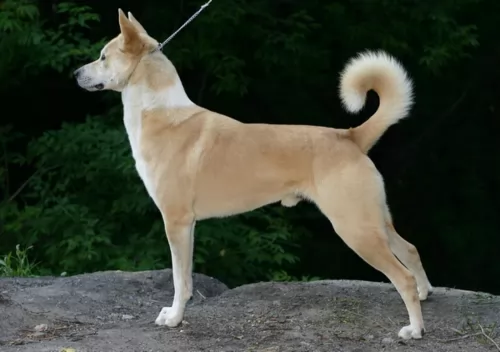 The Canaan Dog is an attractive dog and is Israel’s national breed. Research reveals that the dog’s history can be traced way back to 2200BC.
The Canaan Dog is an attractive dog and is Israel’s national breed. Research reveals that the dog’s history can be traced way back to 2200BC.
The dog’s origins go back to the pariah dog of the Middle East. It is believed that the dog has been perceived as a sacred animal and that he was both guard- and herd dog of the ancient Israelites.
A certain Dr Rudolphina Menzel moved from Vienna to Israel and was asked to establish a service dog organization. She trained and bred them, finding them to be highly trainable. She began a breeding program in 1934, providing working dogs for the military and starting a selective breeding program for the Canaan dog. The Israel Kennel Club dog recognized the Canaan for the first time in 1953.
 The Franzuskaya Bolonka in France is known as the Tsvetnaya Bolonka in Russia and in Germany as the Bolonka Zwetna. All of these translate to Colored Bolognese. It is known as the “Pride of Russia” and was rediscovered by the Russians following the thaw of the Cold War. It is also sometimes translated as a colored lapdog.
The Franzuskaya Bolonka in France is known as the Tsvetnaya Bolonka in Russia and in Germany as the Bolonka Zwetna. All of these translate to Colored Bolognese. It is known as the “Pride of Russia” and was rediscovered by the Russians following the thaw of the Cold War. It is also sometimes translated as a colored lapdog.
The Bolonka is a rare breed in the toy category with ancestors in the Bichon Friese line. This little dog looks very much like the national dog of Cuba – the Havanese. In addition to the Bichon other small dogs in this ancestral line include the Shih Tzu, Toy Poodle, and Pekingese as well as the French, Italian and German Bolonka. They are often confused with the Bolognese as both breeds appear in various countries and have many similarities.
In all countries the common name for this dog is the Bolonka. They have a variety of names and nick names depending on the country. In addition to being the “Pride of Russia” he is called a Russian colored Bichon, Czechs call it the Bareyny Bolonsky, the Germans since 1980 have called it the Bolonka Zwetna but the Nordic Kennel Union does not recognize the Zwenta only the Russian Twetnaya.
The French version is seen to be the original with its ancestry dating back to the 18th century when Russian nobles were presented with a Bolonka by Louis XIV of France, and others migrated with the army of Napoleon to Russia. They were still known as the Bolonka of France. Small dogs were not popular in Russia due to the need for dogs that could work on farms and/or hunt. Particularly during the Soviet years, they were considered unnecessary. No Bolonkas were imported to Russia during the Soviet regime, so only localized breeding took place. The goal of breeders in the Soviet Union was to develop a toy dog, lap sized with an apartment living temperament.
During the cold war the Russians sent a pair of breeding Franzuskaya Bolonka to East Germany and they began to develop the breed there as well. At the same time the colored versions of the Bolonka were being bred. The Franzuskaya Bolonka is recognized by the Verband Dur Das Deutsche Hundewesen (VDF) while the other colored breeds are not. The white Bolonka is not recognized by the Federation Cynoloqique Internationale as a breed separate from the Bolognese but as simply another version. Individual clubs throughout the world recognized one or more versions of the Bolonka. They are thought to be the rarest within the Bichon family.
Today’s Bolonka is owed by Prince William and Princess Kate, giving the breed more publicity than it has had in many years.
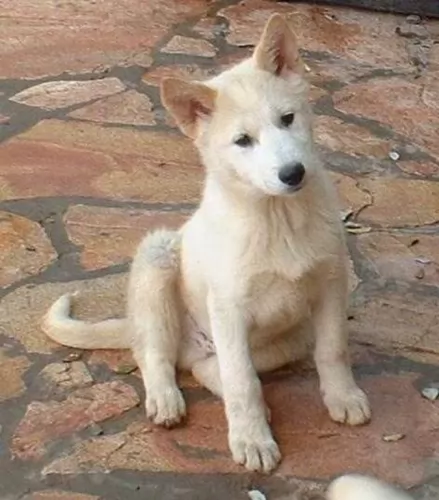 The Canaan Dog is lean, standing at between 51–61cm and weighing roughly 18-25kg. The medium sized Canaan Dog’s coat is medium length and can be sandy to brown, white or black or a mix of these. The eyes are dark and inquisitive, the ears are erect and the high set bushy tail is curled over the back.
The Canaan Dog is lean, standing at between 51–61cm and weighing roughly 18-25kg. The medium sized Canaan Dog’s coat is medium length and can be sandy to brown, white or black or a mix of these. The eyes are dark and inquisitive, the ears are erect and the high set bushy tail is curled over the back.
The Canaan Dog is alert, intelligent, confident and territorial. They are wary of strangers and because they’re alert they’re constantly aware of movement, making them a superb watchdog. However, the dog isn’t aggressive and he makes an excellent family pet, even around children and other pets.
He will need training and socialization though to make him obedient and amicable. He is a strong-willed dog. He is co-operative when being trained and responds well. They are energetic and will make a good companion for runners and cyclists.
 The Franzuskaya Bolonka is neither heavy boned nor fine boned. They are a toy breed with a moderate bone structure. The ears are neither long nor short and they have tails that touch the back at the tip. Like others in the Bichon family the Franzuskaya Bolonka does not shed. He is a sturdy little dog and the male has a distinct beard and moustache that the females of the breed do not. They have long coats that are wavy and curly. The Franzuskaya Bolonka is of course only white. The Russian version might be brown, red, black, wolf-gray, gray and of course white.
The Franzuskaya Bolonka is neither heavy boned nor fine boned. They are a toy breed with a moderate bone structure. The ears are neither long nor short and they have tails that touch the back at the tip. Like others in the Bichon family the Franzuskaya Bolonka does not shed. He is a sturdy little dog and the male has a distinct beard and moustache that the females of the breed do not. They have long coats that are wavy and curly. The Franzuskaya Bolonka is of course only white. The Russian version might be brown, red, black, wolf-gray, gray and of course white.
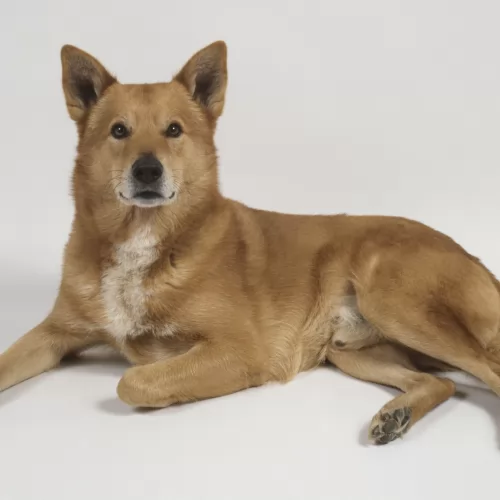 The Canaan Dog is an intelligent dog and this makes him easy to train. He is a strong-willed, independent dog and will require training and socialization to make him obedient. He is an affectionate and loving dog and will make a wonderful family pet.
The Canaan Dog is an intelligent dog and this makes him easy to train. He is a strong-willed, independent dog and will require training and socialization to make him obedient. He is an affectionate and loving dog and will make a wonderful family pet.
The Canaan Dog is also a fairly healthy, robust breed and appeals to many dog owners who don’t have to spend money on professional grooming for him. He doesn’t require much – isn’t high maintenance at all and he is just waiting to become a member of a human family where he can be loved and cared for just like any other family member.
 The Bolonka is great with kids, just avoid too intense play.
The Bolonka is great with kids, just avoid too intense play.
The Bolonka is a playful, lap dog with a lot of love to offer
Good adaptability great in the city in apartments and great in the country as well
They are very smart and love to learn. Being firm but beyond firm is also kind.
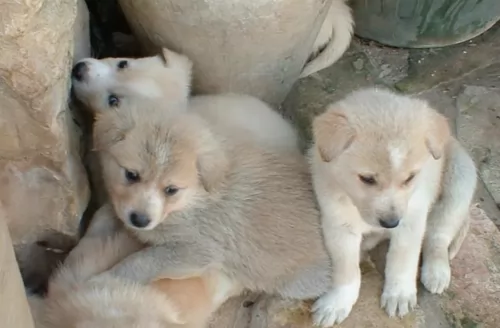 The Canaan Dog has a strong immune system and with good care from his owner he can reach 15 years of age. He has been used to living in harsh conditions in the deserts of Israel.
The Canaan Dog has a strong immune system and with good care from his owner he can reach 15 years of age. He has been used to living in harsh conditions in the deserts of Israel.
If you want to buy a Canaan dog, as with any dog, a good breeder will be able to produce health certificates for the puppy's parents. These certificates confirm that the dog has been tested and cleared of certain common conditions that affect dogs.
Because hip dysplasia is such a common problem with dogs, you may want to see health certificates from the Orthopedic Foundation for Animals (OCA).
A form of cancer that you might expect to see in this breed is Lymphosarcoma, a cancer which affects the lymphoid system. The lymphoid system is a critical part of the dog’s immune system to fight off viruses and bacteria.
 Medical issues are not fully documented because of the rarity of the breed and the years of isolation in the Soviet Union.
Medical issues are not fully documented because of the rarity of the breed and the years of isolation in the Soviet Union.
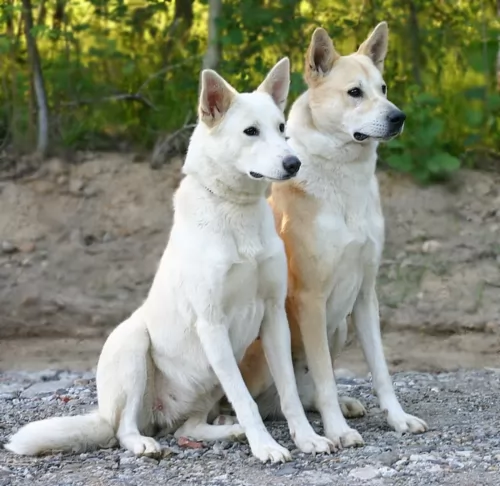 The Canaan Dog needs a steady diet of high-quality food, whether you provide your own home-made food or you buy commercially manufactured food. A healthy diet full of minerals and vitamins is essential for good health. If you’re not sure how to feed your Canaan dog, your veterinarian can advise you according to your dog’s age.
The Canaan Dog needs a steady diet of high-quality food, whether you provide your own home-made food or you buy commercially manufactured food. A healthy diet full of minerals and vitamins is essential for good health. If you’re not sure how to feed your Canaan dog, your veterinarian can advise you according to your dog’s age.
Remember that dogs are carnivorous so even though raw meat can be pretty expensive, you want to include it in his diet from time to time to stave off itchy, dry skin rashes and other illnesses. Always see to it that there is a bowl of fresh, cool water 24/7.
The Canaan Dog is a low maintenance breed who has moderate, seasonal shedding. The coat is easy to groom. He will need a good brush twice a week to keep him free of loose hairs and to keep his coat shiny.
Other kinds of grooming are also important such as brushing his teeth 2 or 3x a week to remove tartar build-up. Bad teeth can affect the immune system and make him ill.
Canaans are going to require a moderate amount of exercise. Just like with any dog, you can’t just buy a cute puppy and when he becomes an adult and no longer cute to you, forget about him in the backyard. A dog is a 15 year responsibility and he will need regular walks and games from you to guarantee his health and happiness.
 Feed at least 3 meals a day. Feed one fourth of a cup daily split into three meals of a high quality puppy food.
Feed at least 3 meals a day. Feed one fourth of a cup daily split into three meals of a high quality puppy food.
Feed at least 2 meals per day. Feed one half of a cup daily split into two meals of a high quality dry food.
Fairly healthy breed due to isolation during cold war
The Franzuskaya Bolonka is developed as a lap dog but that does not mean he doesn’t need daily exercise. He loves to play but play gently and not for any length of time. They like to chase balls, play hide and seek and any tricks you want to teach them.